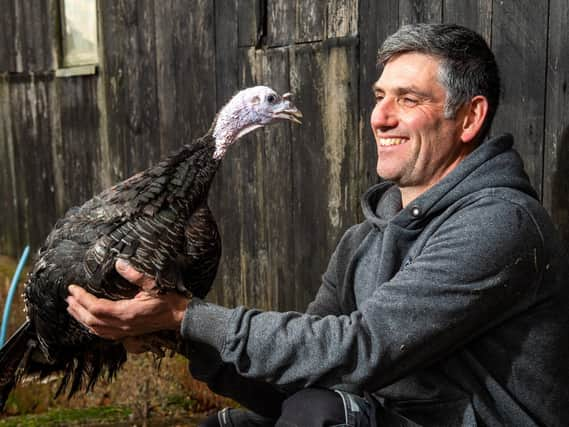Meet the Yorkshire turkey farmer whose family have been rearing Christmas birds since the 1930s


Eastfield Turkeys which is on the suitably named Bird Lane in Oxspring, Sheffield, was founded by Ronald Warttig, whose family were originally from Bavaria. Ronald’s own father was a butcher on Sheffield Road in Barnsley
Following his father into the family business, Richard said it is now a different market to the one Ronald knew.
Advertisement
Hide AdAdvertisement
Hide Ad“Turkeys are totally different today. The meat then was more like pheasant and the traditional turkey was slim bred rather than the plump version everyone buys now.”
Richard said at one time they only sold bronze turkey before the industry developed the white turkey.
But, he said there has been a gradual move back to the traditional bird, largely due to its more intense flavour which has seen their enterprise of 3,500 birds running at two thirds white turkeys to one third black.
Richard’s son Mark, who combines turkey farming with his trade as a machinery mechanic on a farm at Bretton, has become the third generation to join the business along with his wife Amanda.
Advertisement
Hide AdAdvertisement
Hide AdWhen Ronald passed away and Richard started to ease back in 2003, Mark and Amanda moved into Birkfield to carry on the Eastfield Turkeys business and take it in a slightly different direction.
“That is when we went into free range turkeys, as well as barn reared,” Mark said.
“We are wholly committed to producing the best possible traditional turkey we can and with nothing added.
“Our turkeys are as close as you can get to the traditional bird.”
The Warttig heritage is based exclusively on poultry.
“My father was a poultry man,” Richard said.
Advertisement
Hide AdAdvertisement
Hide Ad“We had laying hens and broilers producing chicken for many years.
“At one time we were producing 30,000 turkeys a year for the frozen market and 7,000 fresh turkeys all dry plucked.”
Ronald was also one of six producers who joined together to build a new turkey processing plant near Newark in the 1950s which supplied birds to a new market - the growing frozen supermarket trade.
It was eventually sold when they decided to come out of chickens and move into turkey farming. Richard’s own life and career is firmly rooted in the family farm. “I had always worked on the farm,” he said.
Advertisement
Hide AdAdvertisement
Hide Ad“I studied at Norfolk School of Agriculture in Easton, near Norwich, and I still look after the rearing of the turkeys with Mark.”
As well as the type of bird changing over the years, the way people order them has also altered.
“My wife Rita acted as chief telephonist for turkey orders for many years, but today most of them are made through the internet and by emails or social media contacts.”
One third of the birds currently being raised on the farm are free range with two-thirds barn-reared.
Advertisement
Hide AdAdvertisement
Hide AdMark said the turkeys have a “balanced diet” of wheat, soya and fishmeal so they capture the right vitamins.
“We find that natural oregano oil products help with their overall health and wellbeing,” he said.
After rearing them on to six weeks old, the Warttigs supply 1,000 of their 3,500 turkeys to smaller producers with the rest destined for local butchers and farm shops, as well as individual customers, many of whom, Mark said, have been buying from the family for years.
With everything that has happened this year, Mark said they were concerned about how trade would be this year but have been “delighted” with the orders they have received.
Advertisement
Hide AdAdvertisement
Hide Ad“We thought we might lose some trade at the bigger end of the market, but our regular customers have kept to the same orders and people are definitely looking to shop locally.
“Our butchers and farm shops have ordered as usual which is a relief as we couldn’t have done anything differently ourselves due to the way we order from the hatcheries.”
Demand has been so high, Amanda said there was a chance they may have to close their books early.
“I think everyone just wants to forget this year and have a really good Christmas, whichever way they can,” she said.
Advertisement
Hide AdAdvertisement
Hide Ad“We may have to shut our books early this year as after taking into account our regular customers, it currently looks as though we only have 50 left to sell.
Seeing the customers return each year is something Richard said he really enjoys.
“I still look forward to seeing the customers I have served all of my life every Christmas,” he said.
Comment Guidelines
National World encourages reader discussion on our stories. User feedback, insights and back-and-forth exchanges add a rich layer of context to reporting. Please review our Community Guidelines before commenting.